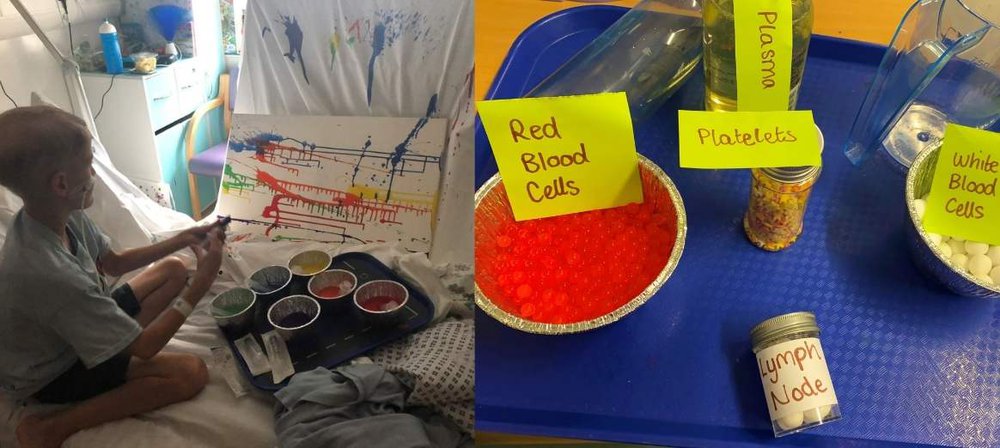"Elephant Ward will always be a big part of us” - John's GOSH journey
14 Apr 2021, 10:49 a.m.
James’ son John was diagnosed with Burkitt lymphoma at Great Ormond Street Hospital (GOSH) in August 2020, aged nine. He went on to have five rounds of chemotherapy while staying on the hospital’s Elephant Ward.
Read more about their experience below.
GOSH during COVID-19
Staff were friendly and welcoming upon the family’s arrival at GOSH last summer. This was the first time John and his parents had been inside the hospital, so they didn’t know what it was like pre-pandemic.
Restrictions meant that John was unable to receive visitors. This included his twin sister, Bethany, with whom he is very close.
Due to the one carer rule, James and John’s mum, Jennifer, took it in turns to stay with John at the hospital. They were like ships in the night, catching up for around five minutes a day.
“It was tough,” recalls James.
John hoped he could spend his 10th birthday at home, but he was too unwell to leave GOSH. This was hard for him, but staff brought birthday celebrations into the hospital to mark the occasion.
Staff "smiling with their eyes"
During his stay at GOSH, John felt so unwell he couldn’t do much.
But sometimes he and his dad would go to St Christopher’s Chapel – a grade II listed building located within the hospital.
John liked sitting in the chapel and the Chaplain was usually around in case they wanted to chat.
When he felt up to it, John also enjoyed painting and once made a tie dye t-shirt for his sister. This was arranged by the Play team at GOSH, who were always very supportive of the family.
“Play Specialist Alanna was an absolute star,” James says. “And even though they wore masks, the Play team and the nurses would always be smiling with their eyes.”

The Play team also arranged an activity for John to help him better understand his diagnosis and treatment for Burkitt lymphoma.
“The activity involved using different items to represent components of the blood," Alanna explains. "Including red blood cells, white blood cells, platelets, plasma, lymph nodes and the cancer cells.”
Alanna explained what each cell's job is and why we need them to keep us healthy.
She then explained what happens to each component when you have lymphoma, how chemotherapy works to help the cancer cells go away, and why there are different side effects to treatments such as hair loss.
Two end of treatment bells
John responded to treatment and, after five months, was discharged from the hospital in December 2020.
In March he returned to GOSH to have his Hickman line (a tube used to intravenously administer medication) removed. During this visit, Alanna arranged for him to ring the end of treatment bell on Elephant Ward.
James was glad John managed to ring his bell surrounded by the staff who supported him.
“They shared John’s very worst moments: the long nights, when John was awake and being sick – barely getting any sleep,” James says. “To ring the end of treatment bell with them was special. Elephant Ward will always be a big part of us.”
Due to COVID-19 restrictions, John’s mum and sister were unable to be there for this special moment. But, afterwards, Alanna wheeled a different end of treatment bell outside. This was so that John could once again ring out, but this time with all his family present.
Advice for other GOSH parents
Here are three of James’ tips for other families with a seriously ill child at GOSH.
- "By resting, you’re not cheating. You need sleep and can leave nurses to do their job. Don’t feel guilty."
- "Ask people for help. People are good, people are kind. And accept help!"
- "If you don’t want to talk about it, that’s fine. Sometimes it’s nice to have WhatsApp chats about other things, like football or a choir you might be part of. It’s okay to just chat about other stuff and not to tell everyone. It’s okay to give yourself distractions by having a corner of your life where people don’t know what’s going on. Tell who you feel you want to tell, don’t feel bad or awkward about not telling others."

